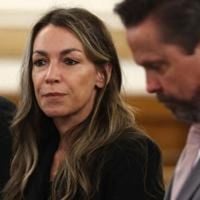Jessica Leslie’s life took a dramatic turn this year, one that has left her career in tatters and cast a spotlight on the high-stakes secrecy of federal grand juries. The 34-year-old Dracut resident, once a rising supervisor at the Massachusetts Department of Children and Families (DCF), now faces sentencing after admitting to leaking confidential grand jury information—an act that, according to her own attorney, she deeply regrets. The case has drawn attention not only for its connection to the high-profile Karen Read trial, but also for the rare prosecution of a grand juror for criminal contempt.
Leslie’s legal troubles began after she served as a federal grand juror on two sensitive investigations. According to The Boston Globe, one of these involved the state’s handling of the murder prosecution of Karen Read, a case that had already generated headlines across Massachusetts. The second investigation focused on alleged corruption within the Massachusetts State Police, specifically accusations that troopers rigged commercial driver’s license tests in exchange for bribes.
From May 2022 through March 2024, Leslie leaked details from these secret proceedings to a close friend. Her attorney, Keith Halpern, described the act as “a serious lapse in judgment,” emphasizing that Leslie “believed that the information would remain private.” Unfortunately for Leslie, that assumption proved disastrously wrong. Her friend posted the sensitive details—including names of witnesses, summaries of testimony, and evidence presented—on X, the social media platform formerly known as Twitter. The posts appeared in January 2024, just days before a sweeping federal indictment against certain State Police troopers was unsealed.
The fallout was swift. The FBI launched an investigation, obtaining search warrants for both Leslie’s and her friend’s cellphones. According to prosecutors, text messages revealed that Leslie had shared confidential material from the grand jury proceedings. The FBI’s probe confirmed suspicions that the social media leaks stemmed from within the grand jury itself—a breach of secrecy that federal law treats with utmost seriousness.
Leslie pleaded guilty to one felony count of criminal contempt in August 2025 in U.S. District Court in Boston. Her sentencing is scheduled for October 2, 2025, before Judge Indira Talwani. Both prosecutors and the defense have recommended a sentence of “one day, deemed served,” which would mean Leslie avoids prison time if the judge accepts the plea agreement. Halpern’s sentencing memorandum paints a picture of a woman who has already paid a steep personal price: “She has suffered serious consequences,” he wrote, “including losing a job she loved.”
Indeed, Leslie’s career at DCF had been on an upward trajectory. She began as a social worker in 2017, balancing her demanding job while earning a master’s degree. Her dedication paid off when she was promoted to supervisor in May 2025, overseeing a team of up to five social workers and managing regular unit meetings. According to state payroll records cited by The Boston Herald, Leslie earned $60,615 in 2025 up until her termination, and $88,468 the previous year. But in the wake of her guilty plea, DCF confirmed that Leslie is “no longer employed” by the agency, though confidentiality rules prevent officials from discussing the specifics behind her dismissal.
Supporters have come forward to vouch for Leslie’s character, describing her as hardworking, empathetic, and dedicated to helping families in need. Doreen DiCienzo, a DCF supervisor who has known Leslie since 2017, wrote to the court that Leslie’s actions were “completely out of character.” DiCienzo recalled how Leslie balanced the demands of her job, graduate school, and a divorce during her time as a grand juror, saying, “There has never been a time … I was concerned [about] her breaking confidentiality in any of the cases that she was assigned.”
Yet the gravity of Leslie’s actions is undeniable. Federal grand jury proceedings are shrouded in secrecy for a reason: leaks can jeopardize investigations, endanger witnesses, and undermine the public’s trust in the justice system. As Halpern acknowledged in his memorandum, “She should have recognized that the violation of grand jury secrecy can cause serious harm to people and to the justice system, but she didn’t. She does understand this now, and her remorse is genuine.”
The case has also shone a light on the Karen Read prosecution, which has been the subject of intense public scrutiny. Read, a former girlfriend of Boston police officer John O’Keefe, was accused of killing O’Keefe with her SUV in January 2022. Prosecutors alleged that Read intentionally backed her vehicle into O’Keefe after a night of drinking and left him to die in a blizzard. Her defense argued she was framed and that O’Keefe was beaten inside a house and then left outside. In a highly unusual move, the U.S. attorney’s office convened a federal grand jury to investigate the state’s handling of Read’s prosecution before her trial began. Ultimately, a Norfolk County jury acquitted Read in June 2025, and the federal grand jury did not return charges against anyone involved in the state prosecution—except, notably, Jessica Leslie.
While prosecutors have not publicly confirmed Leslie’s leak was tied to the Read investigation, major outlets including WCVB and The Boston Globe have reported the connection based on sources familiar with the case. The details Leslie disclosed reportedly included witness identities and the substance of their testimony, information that, if made public prematurely, could have compromised ongoing legal proceedings.
Leslie’s case is a cautionary tale about the far-reaching consequences of breaching grand jury secrecy. In his sentencing memo, Halpern argued that “what she has already gone through, and what she will have to deal with in the future due to the loss of her job, sends a clear message that the violation of grand jury secrecy is a serious offense, and risks wholly upending one’s life.”
Though the court has received letters attesting to Leslie’s integrity and commitment, the law leaves little room for ambiguity when it comes to protecting the sanctity of grand jury proceedings. The loss of her job, her professional reputation, and the prospect of a criminal record are heavy burdens for Leslie to bear—ones that, as her attorney suggests, may serve as a warning to others who might be tempted to disregard the rules of secrecy that underpin the American justice system.
As Judge Talwani prepares to hand down her sentence, the case of Jessica Leslie stands as a stark reminder that even those with the best of intentions can find themselves on the wrong side of the law, and that the consequences of a single mistake can reverberate long after the headlines fade.


